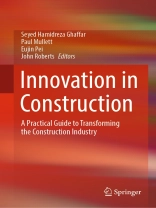This book tackles the complex topic of implementing innovation and the successful application of advanced technology in the construction industry. It provides a practical guide for the transformation of the industry by detailing appropriate and effective implementation methods, required skill sets and structural changes necessary to facilitate the practical and innovative application of technology.
The construction industry is behind other industries in its level of innovation and adoption of technology, and is of critical importance to many of today’s global challenges, such as climate change, global warming and resource scarcity. There is therefore a need for smarter and more efficient ways of managing available resources. This book elaborates on how the innovative application of technology could offer hope for the construction industry in it’s imperative to rise to current and future global challenges. It includes the real-world case studies of innovative projects that go beyond the current state-of-the-art academic research, and have improved productivity, quality and performance in the construction sector.
This book provides readers from both industrial and academic backgrounds with a comprehensive guide on transforming the construction industry with the efficient and effective implementation of technologies and modern methods of construction.
Tabela de Conteúdo
Part I: Industry 4.0 and drivers for change.- What is Industry 4.0?.- The global environmental imperative.- Industry 4.0 and drivers for social sustainability.- Circular construction.- Part II: Innovation in construction.- Fundamentals of Innovation.- Challenges to Innovation in Construction.- Cutting edge practical research on generative design, Io T and digital twins.- Artificial intelligence and data in civil engineering.- Potential application of blockchain technology to transform the construction industry.- Parametric design – A drive towards a sustainable future.- Construction industry transformation through modular methods.- Construction 3D printing: Challenges and opportunities for the construction industry.- Material design, additive manufacturing and performance of cement based materials.- Systems engineering and technology management methodology for the development of construction robots.- Part III: Practical strategies for innovation in practice.- Some changes are invisible to the eyes: Transformation of business models, organizations and cultures.- The next engineers: Equipping industry for the future of construction.- The new generation of construction skills: Transition from onsite to offsite.- Concluding remarks.
Sobre o autor
Dr Seyed Hamidreza Ghaffar: Dr Ghaffar is an Associate Professor in Civil Engineering. He is a Chartered Civil Engineer (CEng, MICE), a Member of the Institute of Concrete Technology (MICT) and a Fellow of Higher Education Academy (FHEA). He is the founder and director of Additive Manufacturing Technology in Construction (AMTC) Research Centre. The focus of AMTC is on valorising construction and demolition waste using materials science and 3D printing to achieve the circular economy goals of sustainable construction. Dr Ghaffar’s research covers several construction materials, with a focus on the development of low carbon technologies suitable for new and retrofitting applications by combining materials sciences and innovative technologies. He has been successful in attracting research grants of circa £6 million on 8 projects funded by the Engineering and Physical Sciences Research Council, British Council, and the European Commission. Dr Ghaffar is the Associate Editor of the Journal of Results in Engineering (Elsevier).
Mr Paul Mullett: Paul’s role as Group Engineering and Technology Director is to drive forward and sustain the relentless pursuit of engineering excellence through the strategic application of transformative technologies, the identification and adoption of value-adding innovation and the development of staff skills necessary for the future of engineering across the global business. As an accomplished professional consultant with over 25 years’ experience in a variety of technical and managerial roles, Paul has a proven track record of providing sound, considered advice to clients based on a practical, technically grounded approach to engineering with a commitment to quality and risk management. Paul is a Chartered Fellow of the Institution of Civil Engineers, a Fellow of the Chartered Institute of Arbitrators, and a registered Professional Simulation Engineer with NAFEMS.
Dr Eujin Pei: Eujin is Associate Dean ofthe College of Engineering, Design and Physical Sciences; and Programme Director for Product Design Engineering at Brunel University London. He is a Chartered Engineer (CEng), Chartered Technological Product Designer (CTPD) and Chartered Environmentalist (CEnv). He is a Fellow of the Institution of Engineering Designers and chairs the British Standards Institute BSI/AMT/8 for Additive Manufacturing; Convenor for the International Organization for Standardization ISO/TC261/WG4 for Additive Manufacturing Data and Design. Eujin leads the Additive Manufacturing and 4D Printing Research Group and Editor-in-Chief for the Progress in Additive Manufacturing Journal.
Mr John Roberts: John Roberts has worked as a technical integrator and collaborator at several of the UK’s top companies for 35 years; winning, designing, and delivering innovative projects. He is currently Chief Engineer for Mc Gee Group’s construction engineering team as well as working as an independent consultant. John previously led and influenced at Laing O’Rourke, Atkins, and Arup, working in London, Los Angeles, Bangalore, and Hong Kong, taking consultant and contractor teams through all project stages from conception to construction. As civil and structural engineer, he has delivered major projects in sectors including aviation, rail, nuclear, water, offices, stadia, and public buildings. The evolving use of digital technology has been a continuing area of focus, starting with CAD and coding in the 1980s, through optimisation and BIM to ongoing involvement with Construction Technology today. The impact this evolution is having on teams and skills continues to be a key interest for him.












